High security to protect Java's garlic fields of gold
Corruption and import restrictions in the name of food safety send prices of staple crops skyrocketing, hurting consumers

Central Java's farming villages are tight-knit and communal. But trust in one's neighbours has wavered over the past month as food prices have soared, turning crops like garlic and shallots into a small fortune.
"If the price of shallots becomes expensive, we have to watch for thieves," said Suripto, one of several farmers who participate in regular night patrols to guard their fields against looters. He says none of his precious shallots have been stolen yet. But the threat has stirred suspicions and put both police and farmers on alert.
During the past month, shallot prices in Indonesia have ballooned from around US$1.20 per kilogram to as much as US$7. Prices of garlic and beef have also increased because of government policies that restrict imports of certain fruits, vegetables, and animal products.
The increase has hit consumers in Indonesia, where spices like shallots and garlic are staples. It has also been a source of intrigue, with stories about price-fixing cartels and busts of illegal onion smuggling operations gracing the pages of local newspapers.
Analysts say the supply shortage stems from complex import licensing procedures and inexplicable limits on goods that Indonesia could never produce enough of on its own.
For instance, a horticultural import regulation that took effect in September requires all fruit and vegetable importers to obtain an import recommendation letter from Indonesia's Ministry of Agriculture, which sets import quotas. Only then can they apply for an import permit with the Ministry of Trade. The import quota system for beef is similar.
Officials say limits are needed to improve food safety and ensure higher incomes for farmers. But without measures in place to help farmers boost their production, development experts say import restrictions often have the opposite effect.